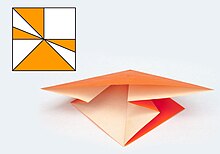Kawasaki theorem
Result about crease patterns with a single vertex that may be folded to form a flat figure
The Kawasaki theorem is a theorem relating to the mathematics of paper folding. It states that when folding paper, a figure will be flat, if and only if all of the angles have an alternating sum of zero.
